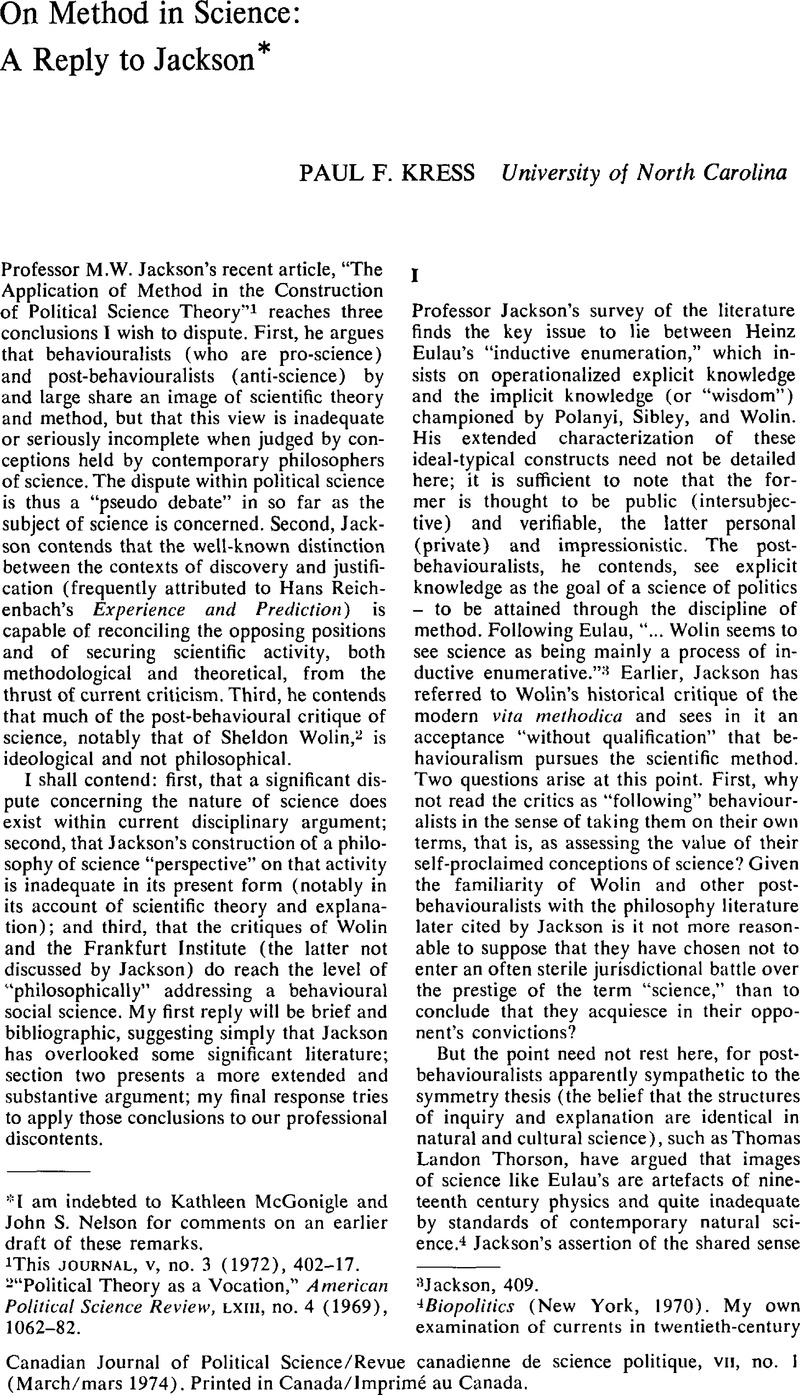No CrossRef data available.
Published online by Cambridge University Press: 10 November 2009

1 This Journal, v, no. 3 (1972), 402–17.
2 “Political Theory as a Vocation,” American Political Science Review, LXIII, no. 4 (1969), 1062–82.
3 Jackson, 409.
4 Biopolitics (New York, 1970). My own examination of currents in twentieth-century behaviouralism has sought to illustrate serious problems within its scientific agenda, again taking the moment largely on its own terms; Social Science and the Idea of Process: The Ambiguous Legacy of Arthur F. Bentley (Urbana, Ill., 1970). I assume that Professor Jackson would view both Thorson and myself as post-behavioural.
5 Probably the most philosophically sophisticated recent advocate of the asymmetry thesis within political science is John Gunnell; see especially, “Social Science and Political Reality: The Problem of Explanation,” Social Research XXXV (1968), 159–201; “Deduction, Explanation, and Social Science Inquiry,” American Political Science Review LXIII (1969), 1233–46, the responses by Arthur S. Goldberg, 1247–58 and A. James Gregor, 1251–9, and Gunnell's rejoinder, 1259–62.
6 Two recent illustrations of the vitality of the asymmetry issue are: Existential Phenomenology and Political Theory, ed. Hwa Yol Jung (Chicago, 1972), and Miller, Eugene F., “Positivism, Historicism, and Political Inquiry,” American Political Science Review, LXVI (1972), 786–7Google Scholar, together with comments thereon, viz.: David Braybrooke and Alexander Rosenberg, “Getting the War News Straight: The Actual Situation in the Philosophy of Science,” 818–26; Richard Rudner, “On Evolving Standard Views in Philosophy of Science,” 827–45; Martin Landau, “On Objectivity,” 846–56; and the rejoinder by Eugene F. Miller, 857–73.
7 Jackson, 409 and note 29. The first point seems somewhat otiose, since Kuhn makes it clear that he is criticizing a textbook distortion of how scientists in fact conduct their inquiries.
8 The Structure of Scientific Revolutions (Chicago, 1962), 151. Kuhn approvingly quotes Max Planck's rather bleak conviction that “a new scientific truth does not triumph by convincing its opponents and making them see the light, but rather because its opponents eventually die, and a new generation grows up that is familiar with it,” 150.
9 Ibid., 145.
10 For a brief account of Duhem's position on this issue see Wartofsky, Marx, Conceptual Foundations of Scientific Thought (New York and London, 1968), 203–4.Google Scholar
11 Note that it is not necessary that a former anomaly have actually undergone experimental scrutiny; a puzzle may be conceptually soluble in the sense that we know how to resolve it, though we are unable to conduct a test due to inadequate technology or cultural prohibition.
12 Abraham Kaplan has pointed out that “validate” and “value” share a derivation from a common root meaning “strength.” The Conduct of Inquiry (San Francisco, 1964), 198.
13 Science and Subjectivity (Indianapolis, New York, Kansas City, 1967), 73. It is itself rather paradoxical that an excessively “idealist” position should find itself allied with a psychological reductionism.
14 Ibid., 13. Jackson's characterization of Heinz Eulau's scientific methodology as “inductive enumeration” (barefoot empiricism?) claims that this position eschews “assumptions about the subject under study,” 405. If he is correct in this interpretation Professor Eulau is apparently engaged in cumulating “formless and nondescript” data.
15 Most prominently Hempel's recent collection, Aspects of Scientific Explanation (New York, 1965).
16 “The Language of Theories,” in Current Issues in the Philosophy of Science, ed. Feigl, Herbert and Maxwell, Grover (New York, 1961), 71.Google Scholar
17 “Explanations, Predictions and Laws,” in Scientific Explanation, Space and Time: Minnesota Studies in the Philosophy of Science, Vol. III, ed. Feigl, Herbert and Maxwell, Grover (Minneapolis, 1962), 221.Google Scholar
18 “Identity, Subsumption, and Scientific Explanation,” The Journal of Philosophy LXVIII, No. 23 (December, 1971), 857. Professor Zaffron's essay, to which I am indebted for much of this argument, specifies two requirements of significant analyticity: “semantic level jumps” and “necessary connection.” On the concept of degrees of analyticity see W.V.O. Quine, “Two Dogmas of Empiricism,” and Putnam, Hillary, “The Analytic and the Synthetic,” in Rosenberg, Jay and Travis, Charles (eds.), Readings in the Philosophy of Language (Englewood Cliffs, New Jersey, Prentice-Hall, 1971).Google Scholar
19 A good introduction to the historical relationship of ideology, theory and science is Ideology, Politics and Political Theory, ed. Cox, Richard (Belmont, Calif., 1969)Google Scholar. For an interesting account of some parallels between analytic and dialectic philosophy and social science ideology see John S. Nelson, “System versus Totality: The Significance of Theory,” unpublished paper, Political Science Department, University of North Carolina, Chapel Hill.
20 Jackson, 416.
21 Wolin has sometimes written as if epic theories and paradigms are in some fashion analogous. Precisely how far he would urge this parallel is unclear. See especially his “Paradigms and Political Theories,” in Politics and Experience, ed. King, Preston and Parekh, B.C. (Cambridge, Eng., 1968).Google Scholar
22 For an illustration of the fundamentally empiricist epistemology of some self-identified post-behaviouralists see Approaches to the Study of Politics, ed. Haas, Michael and Kariel, Henry (Scranton, Penn., 1970)Google Scholar, esp. chap. 1 and 16.
23 Eclipse of Reason, at 179 and 180, quoted in Jay, Martin, The Dialectical Imagination (Boston and Toronto, 1973), 262.Google Scholar
24 Canadian and Anglo-American political scientists will probably know the concerns of the Frankfurt School best through the writings of Herbert Marcuse. One note of caution is in order; protean and prolific as it is, Marcuse's thought cannot be said to reflect the incredible richness of the Institute's intellectual history.
25 For a further examination of this concept see my “Revolution, Libertion, and Utopia: Notes on the Political Thought of Herbert Marcuse,” in The New American Revolution, ed. Aya, Roderick and Miller, Norman (New York, 1971).Google Scholar
26 Jackson, 416.
27 Jay, especially chap. VIII.